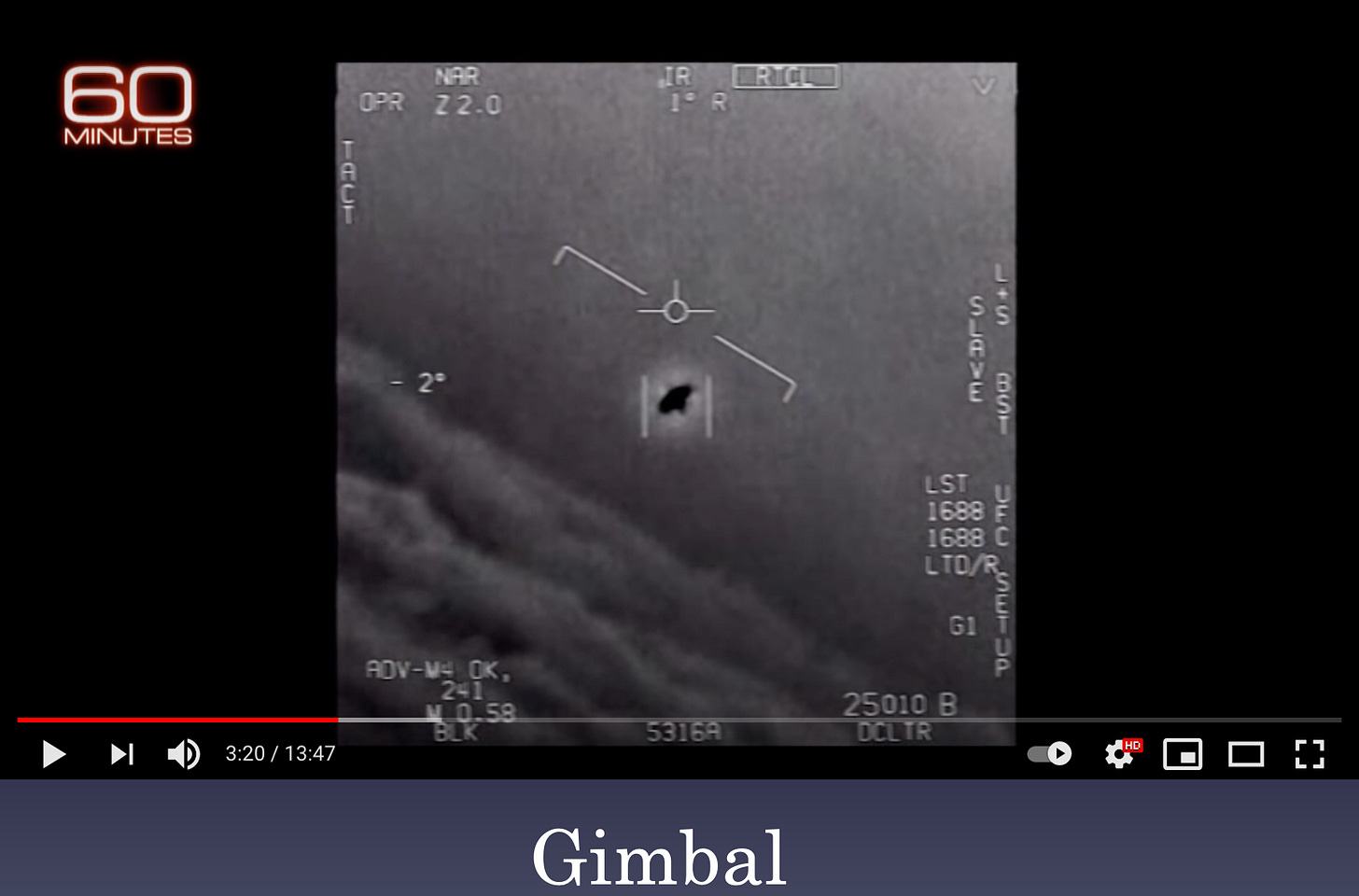A Challenge to Believers in UFOs & UAPs
If you are so confident that contact with aliens has been made & the government is about to disclose what it knows, how about putting your money where your confidence is? A $1000 wager by 12/31/2024?
I have been interested in UFOs, the SETI program (Search for Extraterrestrial Intelligence), and the concept that we’re not alone in the cosmos ever since I started reading Carl Sagan in the 1970s, when the late great Cornell University astronomer and science communicator legitimized the topic as no one before or since. And, of course, it was in the episode on aliens in his 1980 PBS documentary series Cosmos that Sagan made famous the ECREE principle: Extraordinary Claims Require Extraordinary Evidence. (There were predecessors to the concept and wording, but as with most quotes this one migrated up to the most famous person who said it.) My own position is that there are two questions on the table: (1) Are they out there? (2) Have they come here? My answers: (1) Probably yes. (2) Probably not.
The topic is now back in the news as never before, with considerable excitement over a handful of blurry photographs and grainy videos going by the new acronym UAP, or Unidentified Aerial Phenomena, a less baggage-loaded term than UFOs. Not only has the New York Times—the “paper of record” no less—been covering this story, but the august CBS news series 60 Minutes gave it considerable air time. If you’ve been abducted by aliens or migrated early to Mars and missed this story, you can read my analysis of the UAP phenomena, including (as in the screen shot below) the quote from Luis Elizondo, featured on the show as having headed up the government’s UAP program, in which he states that not only does he think “they’re real,” but he thinks the government thinks that as well.
That word “real” is doing a lot of work here, as what the government means is that the videos are real—as in not deep fakes or CGI effects—and most certainly not that they represent real alien spaceships (or Chinese or Russian drones or aircraft). In my analysis I also explain why I am highly skeptical that either hypothesis—extraordinary extraterrestrial (aliens) or extraordinary terrestrial (Russian or Chinese advanced technology)—are true, and that it is much more likely that they represent ordinary terrestrial phenomena.
Here I would like to issue a challenge to UFOlogists and UAPists: put your money where your confidence is. I will put up $1000 if any of you will as well, deposited with a neutral third party, the winner to be determined by an agreed upon third party tribunal with a set date of, say, December 31, 2024, so more than a year and a half from now, giving ample time for said disclosure to be made. We would also need to agree on a set of criteria that constitutes a “hit”, namely that there is unmistakable, irrefutable, undeniable evidence of what would arguably be the greatest discovery in the history of humanity: contact with aliens.
It cannot be, as in the screen shots below, more grainy videos, blurry photographs, and breathless stories about mysterious things in the sky. As I say, if you want to name a new species in biology you need a holotype, a type specimen that other biologists (and anyone else) can see, examine, photograph, analyze, etc. Physical evidence would be ideal, but lacking an alien body or spaceship, something along the lines of what Carl Sagan proposed in his novel and film Contact: a signal that could not be produced by natural phenomena, such as a sequence of prime numbers. SETI scientists have had deep discussions of this Signal Detection Problem, and they have criteria of what would constitute a “hit” response. We need something like this for UFOs and UAPs. I can imagine a “disclosure” event in which, say, the Pentagon, backed by the Joint Chiefs of Staff, Congress, and the President himself, announcing that contact with aliens has been made, or evidence of alien visitation has been discovered, and then presenting it to the public and the scientific community for everyone to see for themselves.
I promise this challenge is not an attempt to troll the UFO/UAP community. I’m serious about this. What do you say Luis Elizondo, Nick Pope, Jeremy Corbell, Steven Greer, the entire team of Ancient Aliens (Giorgio Tsoukalos, Erich von Däniken, David Childress, William Henry), To the Stars Academy (Tom DeLonge, Harold E. Puthoff, Jim Semivan), Jacques Vallee, the researchers at MUFON, NUFORC, UAPTF, CUFOS, NICAP, NIDSci, BUFORA, and anyone else who has been publicly stating that disclosure of alien contact is imminent? Perhaps we could even set up a “betting market” open to the general public to wager money on disclosure by our set date.
If nothing else, it would be a useful exercise in establishing a set of evidential criteria, for this most certainly is a Signal Detection Problem, and that signal—evidence of alien visitation—would unquestionably be an extraordinary one indeed.












I think the UFO/UAP/ETI phenomenon and us human's contemplations of this phenomenon is fascinating and takes on dimensions that approximate faith and religiosity for those that likely eschew religion. For the record, I'm not an active believer in God; but neither am I an active denier of some grand intelligence that we could call "God" doing grand, supernatural things. I don't know myself, so I guess I'm an agnostic? I humbly acknowledge my ignorance here.
I have a BS in Biology, so I have some measure of sophistication with regards to my contemplations of these matters but I'd like to take this opportunity to query those priests of knowledge here who exceed my academic status and who might grace me with their responses. [Sorry for coming off a bit sardonic here, I'm coming from a space that's a bit light-hearted and I mean no ill will. I actually do respect the academic accomplishments of those here, but I confess to gravitating towards an impulse to deflate the egos of those who claim to know more than they probably do about this subject]
A few basic questions I'd like to ask:
(1) Is Human thinking and Human sense-perception up to the task of fully understanding the Universe and any other intelligences we might encounter? We're objectively smart enough to know an alien when we encounter one when an alien manifests itself in a way that is sensible to an alien...right?
(2) Is Human thinking and sense-perception an asset or liability to how well we perceive and process information that we encounter in the Universe? It's fortuitous that Humans evolved in just a way to match all possible ways the Universe can produce, exchange, and process information, right? The ancient Greeks had transcendently brilliant people in their ranks but were utterly ignorant of radio, say; and all the ways information can be transferred therein. But radio waves existed 2000+ years ago in ancient Greece (and everywhere). Is it possible wildly radical and seemingly supernatural processes and phenomena exist in the physical reality of the Universe that humans have yet to encounter or discover but are old hat to ET's?
(3) How do we handle a situation in which our expectations of what ETI's "should be" based upon our understanding of physical reality just doesn't match how they actually are?
(4) If, when thinking about the amazing progress that Humanity has made technologically since the advent of the Enlightenment and the Scientific Revolution, we project into the future that Humans one day will "travel to the stars" isn't that also a proclamation that our current understanding about the Laws of Nature are incomplete? If we acknowledge that our current understanding of physics is "incomplete", why do we let this flawed understanding of Nature inform our notions of what is and what isn't possible with regards to aliens, UFO's, etc. and why we can't perceive them and "where are they?"?
Thanks,
Mike
Michael, I am enough of a scientist to have worked it out for myself. In terms of the two questions you posed, I'd respond in reverse order. Non-earth-based intelligent life has not come here voluntarily. I know that I am stating that rather categorically, but open ended in that I can almost imagine that elements of life might have arrived here "accidentally" by normal processes such as material from space falling on our planet; further I cannot rule out that something that fell here might have been "alive" in some technical sense given the billions of years that have passed since formation of the Solar System and our planet.
However, I differ from most people on your second question even though I must be more specific in order to give my answer. Other than in contexts involving the famous Schrodinger's Cat and/or particle entanglement nothing has ever been observed going faster than light. So that would be a limit on how fast some intelligent thing could travel to get here. A lot of folks don't take into account speeding up and slowing down, but the minimum transit time between two celestial bodies cannot actually be faster than a certain multiple of the speed of light. Energy physics is such that there is a relationship between speed and mass; the more something weighs the more energy it takes to accelerate that object. For any payload, let's say a living creature and its support materials (food? air of some kind? etc) the amount of energy needed to move that ship balloons, then multiplies because you need more energy every time you add an additional source of energy. A creature in such a ship would experience the extreme accelerations as well as extreme radiation over the entire lengthy transit time and it is hard to imagine that any natural intelligence could evolve on any planet with characteristics amenable to travel through hard space. Even worse, if somehow a ship could travel here it would need to be provisioned to return to its origin or face isolation. I don't mention communications back to the home world (impossible), I don't mention the extreme navigation in earth's atmosphere (impossible), I don't mention the lack of detection by humans (also impossible for any real object to achieve). But for me, the biggest reason an intelligent life form has not traveled here is that the transit time, even from a nearby world, would be hundreds and hundreds of solar cycles (years) - what are the odds that some specie somewhere is living for hundreds and hundreds of years, confined in a vehicle, carrying many many many tons of propellant, resisting the radiation and doing all of this without communications back to its home? Nah, nothing like that is happening folks...
But are they out there? Again I answer in the negative, if by "they" we mean an intelligent space-faring living being. It is hard for us humans to envision the multitude of "accidents" that led to the development of intelligent tool-users on this planet. Many species on this planet seize upon objects in their environment to use as tools. Tool making might be an "ordinary" activity of animals on this planet. So be it. However, the number and type and specific timing of cataclysmic events that contributed to the development of creatures such as us is mind-boggling. While infinity is duh infinite, my bet is that there are very few sufficiently advanced technical species that ever develop. Combine this suspected rarity of development with how these civilizations might be spaced out in time and how they might be spaced out within the galaxy and within the universe there won't be many. The traditional calculations go something like: there are so many stars, so many planets, so many galaxies there must be an intelligent species out there somewhere just by the numbers. But when you think about the deepness of time and the immensity of space it is not obvious that such beings, if they could somehow arise, would even occupy any part of our contemporary universe.
For me, the better bet is that the human race is all we know of so-called intelligent life. Our race, our culture, our leadership and our fellows had best start acting like this planet and this people are as valuable and irreplaceable as they probably are...